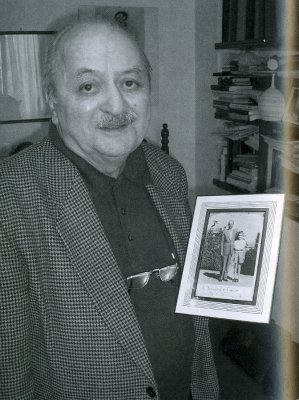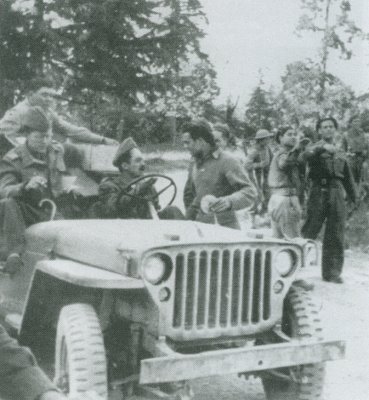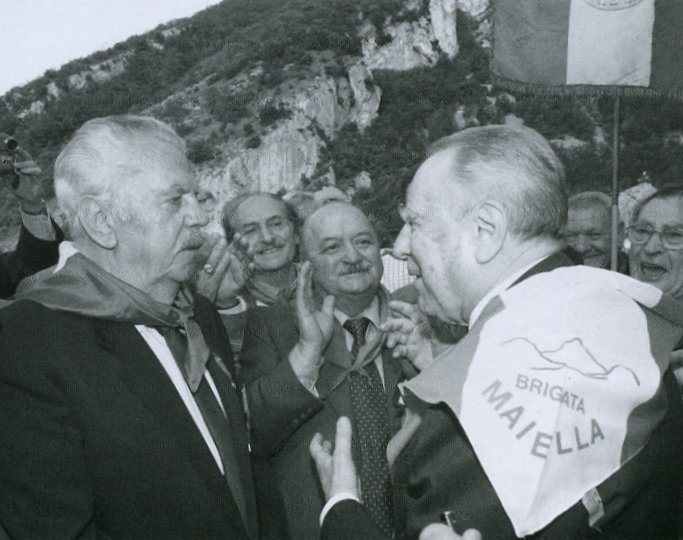|
il Tempo
lunedì 12 marzo 2007 |

Domenico
Troilo[1]
nel gennaio 2005 nella sua abitazione di Gessopalena, dov'
è tornato dopo la pensione, mostra la
fotografia con didica che Umberto II gli invio dall'esilio do Cascais nel
1946.
L'ex Re è ritratto assieme al figlio
Vittorio Emanuele.
Domenico Troilo alla guida della jeep a colloquio con il tenente Mario Sciarra, vicecomandante della IV compagnia del capitano Mauro Filetti, schierata lungo la via Emilia il 20 aplile 1945 alle porte di Bologna. Sul mezzo a fianco del conducente c' è Gerardo Giovacchini e in piedi l'attendente di Troilo, il russo Aleksander Pesterlej detto "Shura". Domenico Troilo, at the wheel of the jeep, is talking to Lieutenant Mario Sciarra, Deputy Commandant of the IVth Company of Captain Mauro Filetti; they are lined up along the Via Emilia on 20th April 1945 at the entrance to Bologna. Gerardo Giovacchini is in the middle next to the driver and standing (at the rear) is Troilo’s attendant, the Russian Aleksander Pesterlej, known as “Shura”.
Il presididente della Repubblica Carlo Azeglio Ciampi si intrattiente con Attilio Brunetti, ex caporal maggiore di fanteria, decorato dai polacchi con la medaglia Virtuti Miltari per aver ricondotto sulle spalle il suo sergente ferito fino alle proprie linee, e con la medaglia d'oro al valor militare italiana. Tra i due, il vicecomandante Domenico Troilo. Nello stesso giorno, il 17 maggio 2001, Ciampi rende omaggio a Taranta Peligna al sacrario dei caduti della Maiella. The President of the Republic, Carlo Azeglio Ciampi, engaging in conversation with Attilio Brunetti, ex Corporal Major of the Infantry, decorated by the Poles with the Medal of Military Honour for having carried his wounded Sergeant all the way to their own lines, and with the Italian Gold Medal for Military Honour. Between the two, is Deputy Commander Domenico Troilo. On the same day, 17th May 2001, Ciampi paid homage at Taranta Peligna in the Memorial Chapel for those from the Maiella who died (in the War). Photos and captions courtesy of : Translator’s Notes for the Photo Captions: [1] Domenico Troilo - fu il vicecomandante e "capo militare", in pratica l'uomo d'azione sul campo, della brigata fondata da Ettore Troilo, con cui condivideva solo il cognome senza esserne affatto parente, che fu il "comandante" perché fondatore e ideologo della formazione. [2] Domenico Troilo - was the Deputy Commandant and "Military Chief" of the Maiella Brigade that had been founded by Ettore Troilo. Practically speaking Domenico was the man of action on the field. They shared the same family name but were not related. Ettore was the "Commandant" because his was the ideology, he had founded the group.
[3]
Cascais
– In Portugal, is 30 km from Lisbon, near Cabo da Roca, Europe's most
westerly point. The town forms part of the zone known as the Estoril
Coast. |
il Tempo
Monday 12th March 2007 |
|
Addio comandante di Lorenzo Verrocchio di Lanciano Il comandante cuore e coraggio se ne è andato. Domenico Troilo, vicecomandante e guida militare della mitica formazione partigiana abruzzese «Brigata Maiella», l’unica la cui bandiera di guerra sia stata decorata con la medaglia d’oro al valor militare per le eroiche gesta durante la Liberazione dall’oppressione nazista, si è spento ieri mattina all’ospedale di Lanciano dov’era ricoverato per problemi cardiaci. Nativo di Gessopalena, Domenico Troilo ha legato indissolubilmente il suo nome alla storia patria, per aver combattuto con gli altri volontari abruzzesi per liberare la sua terra e poi (dal giugno del 1944) il resto del Paese, risalendo la Penisola al fianco dell’VIII Armata Britannica e del II Corpo d’armata polacco, dietro le truppe naziste in fuga. Tanti gli eventi di cui Troilo e la Brigata Maiella hanno scritto pagine indelebili: il sacrificio per spezzare la linea Gustav, presidiata dai tedeschi, e la inarrestabile marcia verso il Nord (i primi soldati a entrare a Bologna nell’aprile 1945 furono i «maiellini»). I partigiani del Gruppo di patrioti della Maiella, di cui fu «Comandante» Ettore Troilo (morto a Roma nel 1974), furono definiti «i nuovi «mille d’Italia» da Carlo Azeglio Ciampi quando questi era al Quirinale. Nei libri di storia i maiellini sono entrati come un gruppo partigiano senza appartenenze e che mai giurò fedeltà ai Savoia ai quali, invece, attribuivano gravi responsabilità per i disastri in cui la nazione era incorsa prima e dopo l’armistizio. Tante le visite ieri pomeriggio presso la camera ardente del comandante partigiano, allestita dalle ore 16 circa in Provincia a Chieti. I funerali sono previsti per le ore 15.30 di oggi a Gessopalena. Domenico Troilo lascia la moglie Nella Traboccone ed i figli Alberto e Barbara, residenti a Milano. Il presidente della Repubblica Giorgio Napolitano ha inviato ai familiari di Domenico Troilo il seguente messaggio: «Partecipo commosso al dolore della famiglia e al cordoglio delle associazioni partigiane per la scomparsa di Domenico Troilo, vice comandante e responsabile militare della Brigata Maiella, popolare figura di combattente per la libertà e la democrazia repubblicana». In un telegramma di cordoglio, il presidente della Regione Abruzzo, Ottaviano Del Turco, ha parlato di una «figura leggendaria che ha segnato la storia di questa regione e dell’Italia intera», ordinando inoltre di tenere a lutto le bandiere dell’ente Regione sino ai funerali di oggi. Parole di grande significato espresse anche dal mondo politico: «Se da sessanta anni - ha detto il segretario nazionale dei Ds Fassino - l’Italia è una nazione libera e democratica lo si deve a quanti, come i Troilo, riscattarono l’onore del Paese con il loro coraggio e la loro generosità». Al cordoglio si sono uniti anche il sindaco di Gessopalena, Antonio Innaurato, l’ex parlamentare Pio Rapagnà, l’onorevole Giampiero Catone, Geremia Mancini (Ugl), il segretario regionale dei Ds, Stefania Misticoni, il sindaco di Bologna, Cofferati, associazioni e rappresentanti istituzionali. |
Farewell Commandant by Lorenzo Verrocchio of Lanciano The Commander who was all heart and courage has died. Domenico Troilo, deputy leader and military guide of the mythical Abruzzan partisan formation, the “Brigata Maiella” (Maiella Brigade), the only group whose war banner was decorated with the Gold Medal for Military Valour for their heroic actions during the Liberation from Nazi oppression, died yesterday morning in the hospital at Lanciano where he had been admitted with heart problems. Born in Gessopalena, Domenico Troilo linked his name indissolubly to our country’s history, because he fought with the other Abruzzan volunteers to free his land and then from June 1944 the rest of the Country, going up through the peninsula beside the VIIIth British Army ad the IInd Armed Polish Corps, following the Nazi troops that were in flight. So many unforgettable events took place in which Troilo and the Maiella Brigade played an active part that innumerable pages have been written about them: the sacrifices needed to break the Gustav line, guarded by the Germans, and the unstoppable march to the North (the first soldiers to enter Bologna in April 1945 were the “Majellans”). Partisans from the Group of Patriots of the Maiella, of whom Ettore Troilo (who died in 1974 in Rome) was Commandant, were defined as the new “mille d’Italia”[1] (thousand of Italy) by Carlo Azeglio Ciampi[2] when he was at the Quirinale[3]. In our history books, the Maiellans are described as a Partisan Group without affiliation, who never swore loyalty to the House of Savoy[4] because the Partisans attributed them with being responsible for the disasters that beset the Nation both before and after the Armistice. There were many visitors yesterday afternoon to the mortuary chamber, from about 4 o’clock that had been prepared in the Province at Chieti for the Partisan Commandant. The funeral will take place today at 3:30 pm in Gessopalena. Domenico Troilo leaves a wife, Nella Traboccone, and his children Alberto and Barbara who live in Milan. The President of the Republic, Giorgio Napolitano, sent Domenico Troilo’s family the following message: “I join with the family in its pain and with the grief of the Partisan Association, for the loss of Domenico Troilo, deputy leader and military chief of the Maiella Brigade. He was a popular figure who fought for the liberty and democracy of our Republic.” In a condolence telegram, Ottaviano Del Turco, President of the Abruzzo Region, mentions him as “a legendary figure who left his mark on the history of this Region and on Italy itself”; he ordered that flags throughout the entire Region should be flown at half-mast until after the funeral today. Politicians also uttered words of great significance: Sig. Fassino, National Secretary of the DS[5] said, “That Italy has been a free and democratic Nation for the past 60 years, is due to people such as Troilo, who ransomed the Country’s honour with their courage and their generosity”. Others who sent condolences include the Mayor of Gessopalena, the honourable Giampiero Catone, Geremia Mancini (Ugl), the Regional Secretary of the DS, Stefania Misticoni, the Mayor of Bologna, Sig. Cofferati, and representatives of other associations and institutions. |
|
|
||
| Translation courtesy of Dr. Marion Apley Porreca | ||

